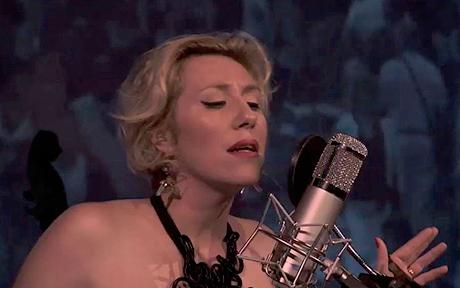Music |
Martha Wainwright’s Piaf Record: Sans Fusils, Ni Souliers, A Paris
By
Published: Dec 16, 2009
Category:
World
It was the last benefit of the summer in the Hamptons. Rufus Wainwright and Norah Jones were the headliners. Martha Wainwright – sister of Rufus, a comparative unknown — was the opening act. As she came on stage, the audience was checking its make-up, texting, drinking, chatting.
Talk about your uphill swim! Martha Wainwright began singing — in French — an Edith Piaf song. The talking continued. She put a hand in the air, lost in the world of France’s most celebrated singer. In another minute, she had the attention of those inattentive Hamptonites. In ten, she pretty much owned them.
How did she do it?
Well, she has a greater ability to cram emotion into her voice than any female singer since — let’s go out on a limb here — Janis Joplin. An outrageous claim? Watch her sing “Hallelujah” with her brother. If you’re in the Leonard Cohen cult, you know that Rufus Wainwright’s version is ranked in the top three or four. Now consider what happens at 2:30, when Martha takes over.
Loud, raspy, passionate — but then, this is the woman who has titled a song “Bloody Mother Fucking Asshole” and a CD “I Know You’re Married But I’ve Got Feelings Too.”
Happily, that’s only half of her.
The other half is that raised hand, open, slightly cupped. I see that hand up in one of her slower songs, and — this may sound creepy, but bear with me – I can almost feel it against my cheek. Nothing more. Just a touch. But what intimacy in that touch, what kindness! And that makes Martha Wainwright an essential artist for me: She can rasp and she can whmper.
On Sans Fusils, Ni Souliers, A Paris: Martha Wainwright’s Piaf Record, she turns a personal exploration into a summiting of Everest — she does something that’s almost impossible to pull off. That is, she doesn’t “become” Piaf; that would be a parlor trick. Instead, she reinvents Piaf for a generation that knows a handful of songs — “La Vie En Rose” and “Milord” and “Non, Je Ne Regrette Rien”, none of which are on her CD — and the recent biopic, “La Vie En Rose,” which she has never seen.
What’s remarkable about Wainwright’s recording of 15 Piaf songs is how fresh, spontaneous and unrehearsed they are. But let her tell it:
Edith Piaf was a favorite singer of mine when I was a kid. Aged 7 or 8, my brother Rufus and I would belt out her songs, particularly "Milord", at the tops of our voices. I don’t know why — maybe it’s that emotive singing voice of hers, that sense of complete vocal abandon. That’s very appealing to a child. It seemed so elemental and raw. My appreciation of her has remained a constant.
I remember the sensation — the complete abandon that her voice evokes. It was almost like a daydream of soaring. I would sing along at the top of my lungs and imagine myself on a giant swing in the middle of the living room.
I didn’t do too much research into Piaf’s life before making the album. I don’t look like her and I’m not an actor. She became the ghost behind all that I sang and hopefully I conjure something of her. I have a great amount of respect for Piaf. The power of her music, the crackling emotion of it, is rooted in our knowledge that these songs of longing and pain are from her own life. Her story is told in those lyrics.
We made this record over two days in a small venue in downtown New York called Dixon Place. The focus was to make an album but also to capture the excitement of a live show. It was challenging because the vocals all had to be done in one take without stopping.
My voice isn’t very birdlike, more like man’s best friend. What I did do, like Edith, was take myself to the edge when I recorded it. I put myself under so much pressure in the recordings and scattered some of my own tormented fairydust over the lyrics. I wasn’t singing in my own language, I’m reading these lyrics in front of a live audience, we’ve had five days of rehearsal.
Most of the versions she chose were from the last of three consecutive performances. Her voice was largely shot — so she treated herself to a glass or two of wine. The result is an emotional wringer of a CD, useful as background music at low volume, harrowing and beautiful by turns if played loud. Wainwright makes no apologies: “Piaf was an incredibly emotional singer and I’ve always been an incredibly emotional singer and pained singer."


